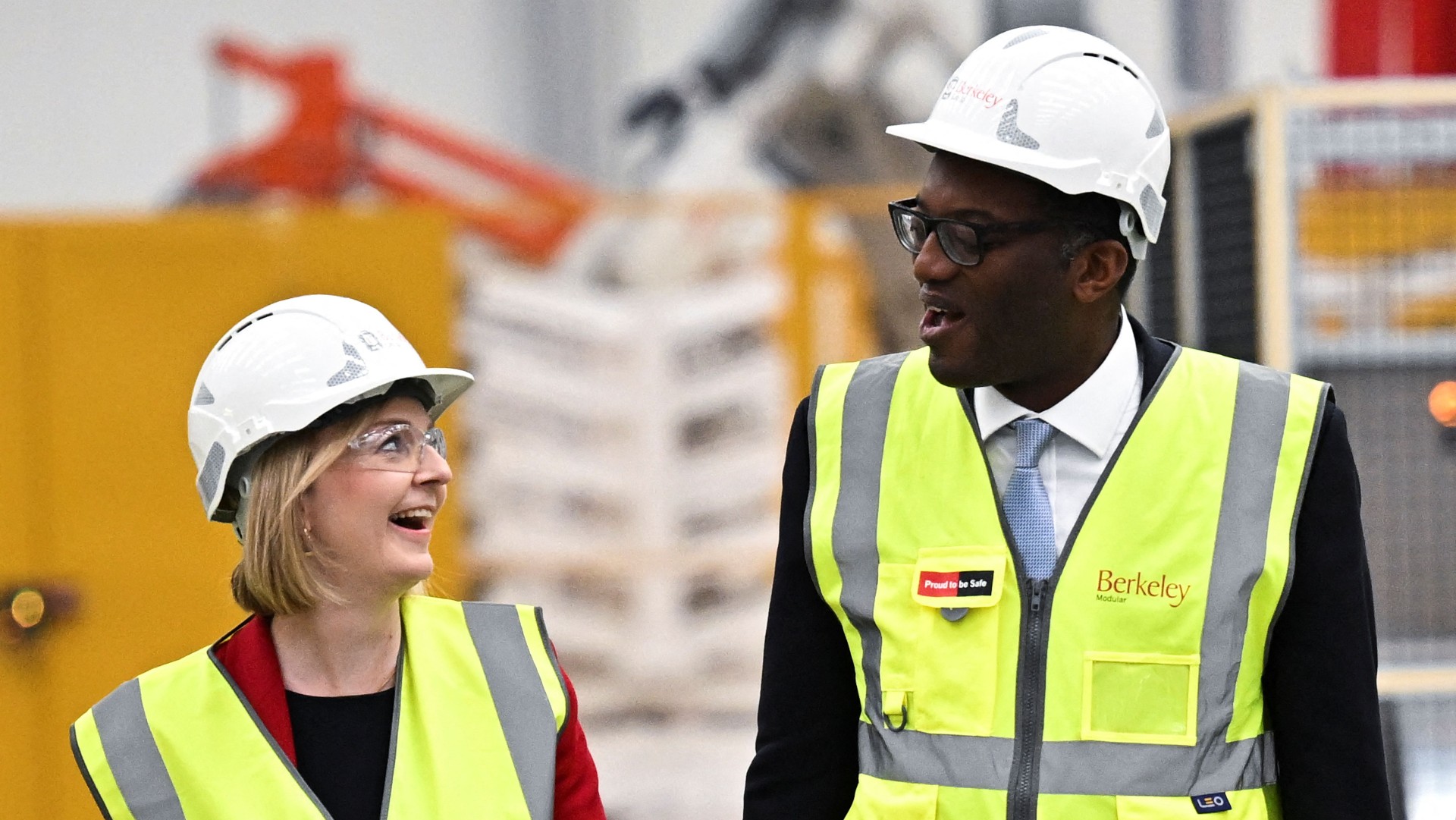Can Truss and Kwarteng pull off their growth plan?
PM and chancellor face criticism that tax cuts fail to address underlying issues with UK economy

A free daily email with the biggest news stories of the day – and the best features from TheWeek.com
You are now subscribed
Your newsletter sign-up was successful
Liz Truss and Kwasi Kwarteng are facing an early test of nerve after their radical tax-cutting policies prompted huge market uncertainty, a crash in sterling and the prospect of further interest rate hikes to deal with spiralling inflation.
Having effectively gone all in in pursuit of GDP growth as the panacea for all the UK’s economic woes, and by insisting they will not comment on market movements and let the turbulence play out by itself, the prime minister and chancellor “are limited in what they can do to contain the fallout”, said the i news political editor Hugo Gye.
‘Certainly radical’
The plans unveiled by Kwarteng in his so-called “mini budget” on Friday “are certainly radical and there are many initiatives which should stimulate growth”, said Mike Warburton in The Telegraph.
The Week
Escape your echo chamber. Get the facts behind the news, plus analysis from multiple perspectives.

Sign up for The Week's Free Newsletters
From our morning news briefing to a weekly Good News Newsletter, get the best of The Week delivered directly to your inbox.
From our morning news briefing to a weekly Good News Newsletter, get the best of The Week delivered directly to your inbox.
Among them are the reversal of the National Insurance rise, scrapping the planned rise in corporation tax, a cut in the basic rate of income tax brought forward to next April and, most eye-catching and controversial, abolishing the 45p top rate of tax.
Yet concern over increased government borrowing to pay for tax cuts and the energy support packages, at a time when state debt is becoming more expensive all around the world, has spooked investors.
“The fact the Chancellor refused an offer from the Office for Budget Responsibility to publish an economic assessment gave the impression that Kwasi Kwarteng was hiding from reality,” wrote former shadow chancellor John McDonnell in The New Statesman. “It simply reinforced the belief that the mini-budget was a massive gamble based more on ideology than economic science.”
‘Tax cuts are just a quick-fix sugar-high’
“Kwarteng is right to focus on the labour market if he wants to boost growth,” said Sarah O’Connor in the Financial Times, “but last week’s policies were small solutions to problems that don’t exist, rather than big solutions to the problems that do.”
A free daily email with the biggest news stories of the day – and the best features from TheWeek.com
Chief among these is increasing productivity. “Tax cuts are just a quick-fix sugar-high,” said John Van Reenen, an economics professor at LSE. “They do not deal with the UK’s fundamental problem of miserable productivity growth.”
In a bid to calm markets, the Treasury is planning a series of announcements about structural “supply-side” reforms that aim to drive growth in conjunction with tax cuts.
“Common sense and reams of economic studies show that this is simply not the case,” argued Van Reenen. “Many high tax economies like Germany and the Nordic nations are robustly successful and big tax cuts for top earners have no clear relationship with growth (although they definitely increase inequality).”
The polling problem
With Politico reporting that Labour leader Keir Starmer is “gearing up to fight the next general election on the economy and is pitching Labour as the party of fiscal rules and responsibility”, the latest polls will make uneasy reading for the government.
A YouGov survey for The Times found Labour has a 17-point lead over the Tories, the largest the party has enjoyed in more than two decades.
“If your plan is unpopular with the markets but popular with voters, then that’s an OK place to be,” a Tory source told the Times, “but if you’ve spent all this money and it’s unpopular with everyone, then that is very dangerous.”
The question then becomes whether Truss and her team have the belief, and more importantly the nerve, to stick to their guns and ride out the storm in the hope growth will pick up before the next election in two years’ time. Or will the rest of the Tory party force them to U-turn before they risk permanently damaging the Tories’ economic credibility?
-
 The Gallivant: style and charm steps from Camber Sands
The Gallivant: style and charm steps from Camber SandsThe Week Recommends Nestled behind the dunes, this luxury hotel is a great place to hunker down and get cosy
-
 The President’s Cake: ‘sweet tragedy’ about a little girl on a baking mission in Iraq
The President’s Cake: ‘sweet tragedy’ about a little girl on a baking mission in IraqThe Week Recommends Charming debut from Hasan Hadi is filled with ‘vivid characters’
-
 Kia EV4: a ‘terrifically comfy’ electric car
Kia EV4: a ‘terrifically comfy’ electric carThe Week Recommends The family-friendly vehicle has ‘plush seats’ and generous space
-
 Will Trump’s 10% credit card rate limit actually help consumers?
Will Trump’s 10% credit card rate limit actually help consumers?Today's Big Question Banks say they would pull back on credit
-
 What will the US economy look like in 2026?
What will the US economy look like in 2026?Today’s Big Question Wall Street is bullish, but uncertain
-
 Is $140,000 the real poverty line?
Is $140,000 the real poverty line?Feature Financial hardship is wearing Americans down, and the break-even point for many families keeps rising
-
 Fast food is no longer affordable for low-income Americans
Fast food is no longer affordable for low-income AmericansThe explainer Cheap meals are getting farther out of reach
-
 Why has America’s economy gone K-shaped?
Why has America’s economy gone K-shaped?Today's Big Question The rich are doing well. Everybody else is scrimping.
-
 Should Labour break manifesto pledge and raise taxes?
Should Labour break manifesto pledge and raise taxes?Today's Big Question There are ‘powerful’ fiscal arguments for an income tax rise but it could mean ‘game over’ for the government
-
 Autumn Budget: will Rachel Reeves raid the rich?
Autumn Budget: will Rachel Reeves raid the rich?Talking Point To fill Britain’s financial black hole, the Chancellor will have to consider everything – except an income tax rise
-
 From candy to costumes, inflation is spooking consumers on Halloween this year
From candy to costumes, inflation is spooking consumers on Halloween this yearIn the Spotlight Both candy and costumes have jumped significantly in price